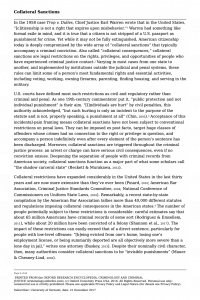Collateral Sanctions
Alec C. Ewald, Oxford Research Encyclopedia of Criminology
This article discusses collateral sanctions—legal restrictions on the rights and privileges of people who have experienced contact with the criminal justice system, particularly contact resulting in conviction. As the author states, these sanctions are usually placed in civil and regulatory codes and may limit a person’s ability to vote, live in public housing, own a firearm, qualify for an occupational license, serve in the military, receive public benefits, sit on a jury, or borrow money for college, among other activities. Yet, the author continues, because they are usually defined as “indirect” consequences of a conviction, they may never surface in the criminal justice process, and they frequently extend far beyond the sentence.
The article asserts that such restrictions can deeply compromise the civic status and life chances of Americans with conviction records and argues that their reach and severity in the United States appear to be unique in the democratic world and mark an important respect in which the American carceral state extends beyond mass incarceration.
